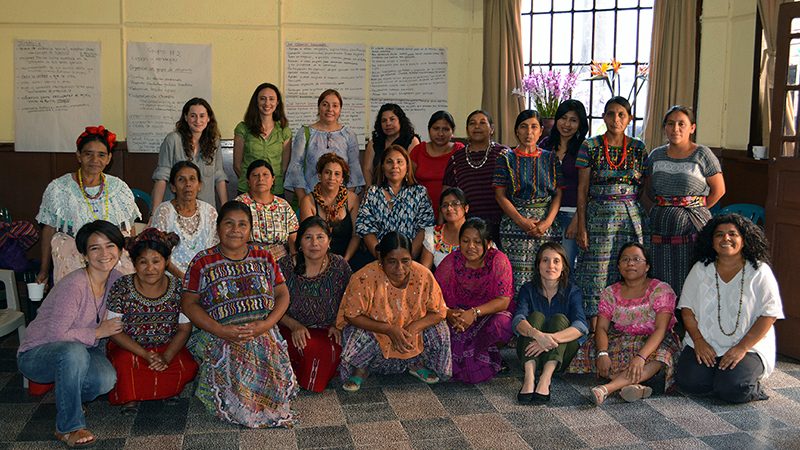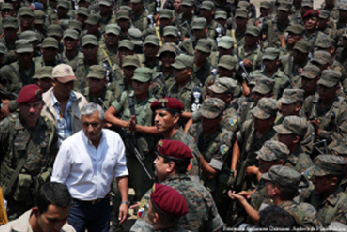Beginning in 2007, Mayan communities around the Cambalam River overwhelmingly began rejecting large-scale development projects, including hydroelectric dams and mining activities, for both the ecological and cultural impacts they would have in the region.
In a community meeting held in Barillas on June 23, 2007, the community expressed its opposition to the proposed Cambalam hydroelectric project and denounced the lack of prior and informed consent. In a community referendum in which 46,481 people participated, 46,472 voted against allowing any development project that could pose a risk to the environment.
Despite the overwhelmingly unified voice of the population, in 2011 the Ministry of Energy and Mining granted a construction license to Hidro Santa Cruz, subsidiary of Hidralia Energia, a Spanish-owned hydroelectric company which plans to build a dam in the area. Local leaders have since led ongoing resistance to the dam, which threatens to destroy communal lands used for recreation and religious ceremonies.
In 2009, the municipality attempted to prevent any new construction on the Cambalam River. However, Hidro Santa Cruz took the local government to court and won on the grounds that Guatemalan municipalities had no existing regulations governing construction projects.
On the afternoon of May 1, 2012, three community leaders were attacked by armed gunmen. Andrés Francisco Miguel was murdered on the spot, while Pablo Antonio Pablo Pablo and Esteban Bernabé Gaspar were seriously injured. The attack was apparently carried out by 2 security guards employed by Hidro Santa Cruz.
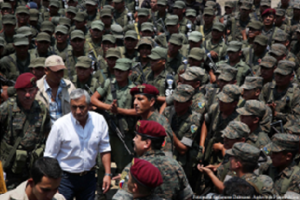
The death of Andrés, a local leader opposed to the dam, set off a series of protests by local residents who saw this as the latest and most egregious violation of their rights by the company. A group of local residents forced their way into a Guatemalan military base and disarmed the soldiers. Not finding the employees there, they eventually withdrew.
On May 1, 2012, the administration of President Otto Pérez Molina responded to community protests by declaring a state of siege in Barillas, suspending constitutional rights and placing the army in control of the area. Interior Secretary Mauricio López Bonilla sent a contingent of 500 military and 350 police forces to Santa Cruz Barillas to “restore order.”
Following the declaration of a state of siege, GHRC issued a condemnation of the excessive and arbitrary reaction of the Guatemalan government on May 1, 2012.
On May 2, 2012, civilians linked to the hydroelectric company immediately rounded up local leaders opposed to the dam and handed them over to the authorities for arrest. Eleven opponents to the mine were taken to a high-security prison in Guatemala City and charged with crimes ranging from armed robbery to terrorism. In total, 19 local leaders, 17 men and 2 women, were detained. The UN Office of the High Commissioner for Human Rights declared 9 of the arrests illegal.
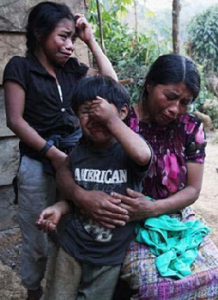
The soldiers and police began kicking down doors without search warrants and tearing through houses. Men and women were separated for questioning. Security forces also sexually harassed the women and threatened them with rape.
On May 15, 2012, over 6,000 Guatemalans marched in solidarity in Huehuetenango, the capital city of the department where Barillas is located.
Two weeks after the illegal arrest of Esteban Bernabé Gaspar and Pascual de Pascual Pedro, their pre-trial hearing took place. They were charged with kidnapping, illegal detention, breaking and entering, threats, coercion, aggravated arson, aggravated robbery, attack on a public utility, and terrorism. They were being charged for previous acts of resistance against the hydroelectric company in March 2012.
The public prosecutor produced no evidence linking Esteban and Pascual to those crimes. However, the judge decided that while there was not enough evidence to proceed with a formal trial against them, that there was enough evidence against them regarding the charges of unlawful detention, coercion, aggravated arson, and terrorism. The trial date was set for August 15, 2012. The judge denied their bail request and ordered them to return to prison until their trial.
On May 18, 2012, President Pérez Molina lifted the state of siege. The president will allow Hidro Santa Cruz to continue working in the area under a mandate to be environmentally and socially responsible.
On May 25, 2012, the authorities captured the men allegedly responsible for the May 1, 2012 attack in Santa Cruz Barillas. An investigation into the attack revealed that the 2 men captured had been subcontracted to work as security guards for Hidro Santa Cruz.
A coalition of organizations that includes GHRC named “Todos y Todas Somos Barillas” (We are All Barillas) was formed to coordinate follow-up actions, including support for the community leaders who were attacked or detained and their families. The coalition accompanied the residents of Barillas in a second protest on June 18, 2012 against the usurpation of land and displacement of communities. Nonetheless, the intellectual authors of the attack have not been identified or brought to justice, and the company continues to operate with complete impunity. On June 29, 2012, the families of those detained held a press conference denouncing the arrests as illegal.
On July 25, 2012, a court in Santa Eulalia reported that arrest warrants existed for another 33 activists and leaders in Santa Cruz Barillas, following the 11 arrests made during the State of Siege in May.

On September 21, 2012, Marcos Mateo Miguel appeared in court with 7 of the defendants. No evidence was presented tying him to the protests on May 1, 2012. The judge declared him innocent and ordered his immediate release. He had been unjustly imprisoned for nearly 150 days.
On September 25, 2012, the court annulled the arrest warrants against 10 of the 33 accused due to lack of evidence.
On November 14, 2012, a judge decided to provisionally close the case against Esteban Bernabé Gaspar and Pascual de Pascual Pedro, citing the lack of evidence presented by the public prosecutor’s office. Both men were released, pending an appeal.
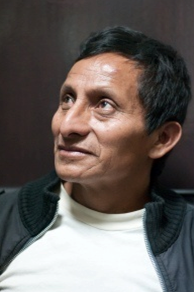
In December 2012, the communities continued peaceful protests against the project and the mayor provisionally suspended signing an agreement with the company. The company has invested Q50 million to date in the project, and hopes to begin construction in February 2013.
On January 1, 2013, Judge Luis Fernando Pérez Zamora of Santa Eulalia ordered the immediate release of the 8 detainees and rejected all civil or legal action against them. All of them were declared innocent of the charges brought against them.
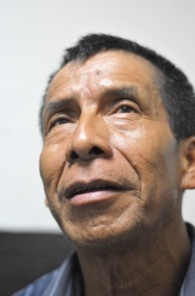
On February 22, 2013, Human Rights Ombudsman Jorge de León Duque asked the Court Supervisory body to investigate the four judges involved in the case of the 9 community leaders who were captured in Santa Cruz Barillas in May 2012. According to De León, the delay requiring the detainees to wait for their case to be heard 16 days after their arrest represents a violation of their human rights and due process. The ombudsman accused the judges of: ruling without regard to the detainees’ right to have their offenses classified as assault, robbery, and illicit association; ordering the transfer of the detainees to jail without informing them of the reason; not using translators knowing that the detainees spoke q’anjob’al; and hearing the case without having legal jurisdiction.
On March 15, 2013, Arcenio Rubén Herrera Herrera, human rights defender and member of the Departmental Assembly of Huehuetenango for the Defense of Natural Resources (ADH), was arrested for “generating unlawful acts” against the operation of the Hidro Santa Cruz. He was charged with 12 crimes, including terrorism, burglary, abduction and kidnapping, and damage to private goods. ADH made a call to national and international organizations to demonstrate their solidarity against the systematic violation of their rights. Although the Public Prosecutor’s Office argued the case should not continue without sufficient evidence linking Herrera to the alleged crimes, the judge ordered the case move to pretrial proceedings on May 30, 2013.

